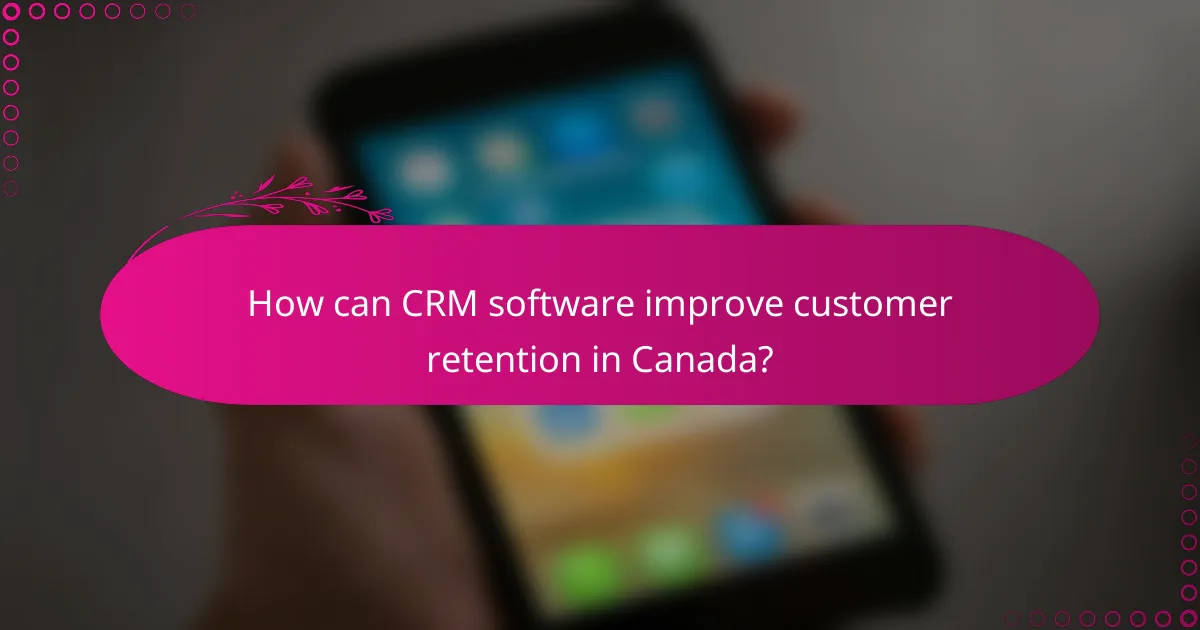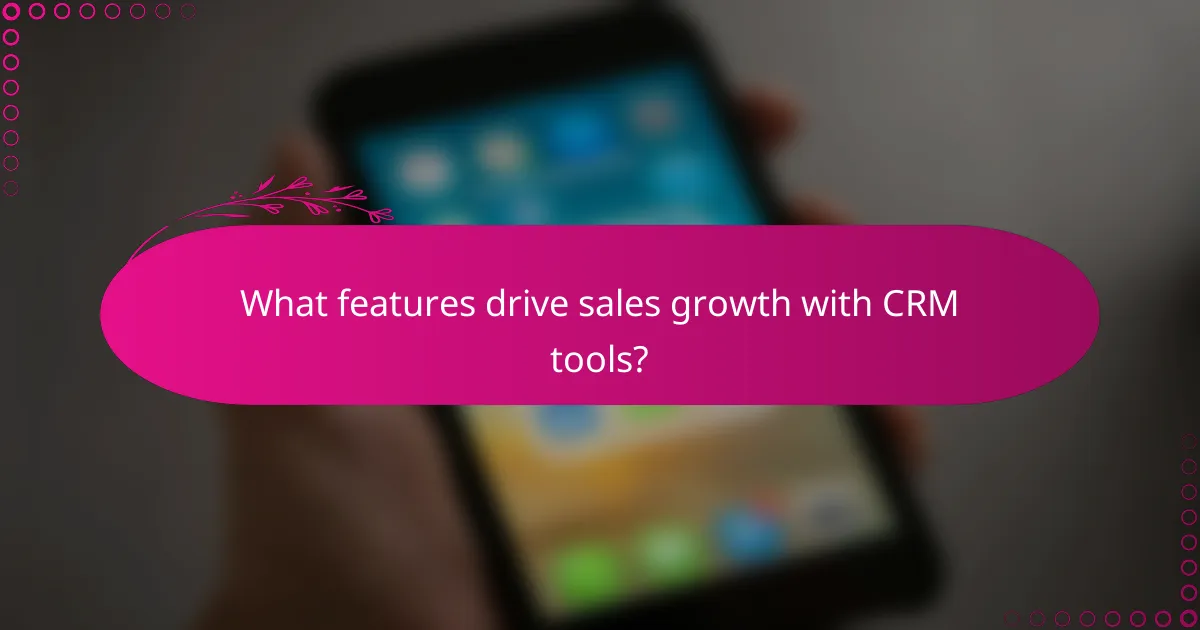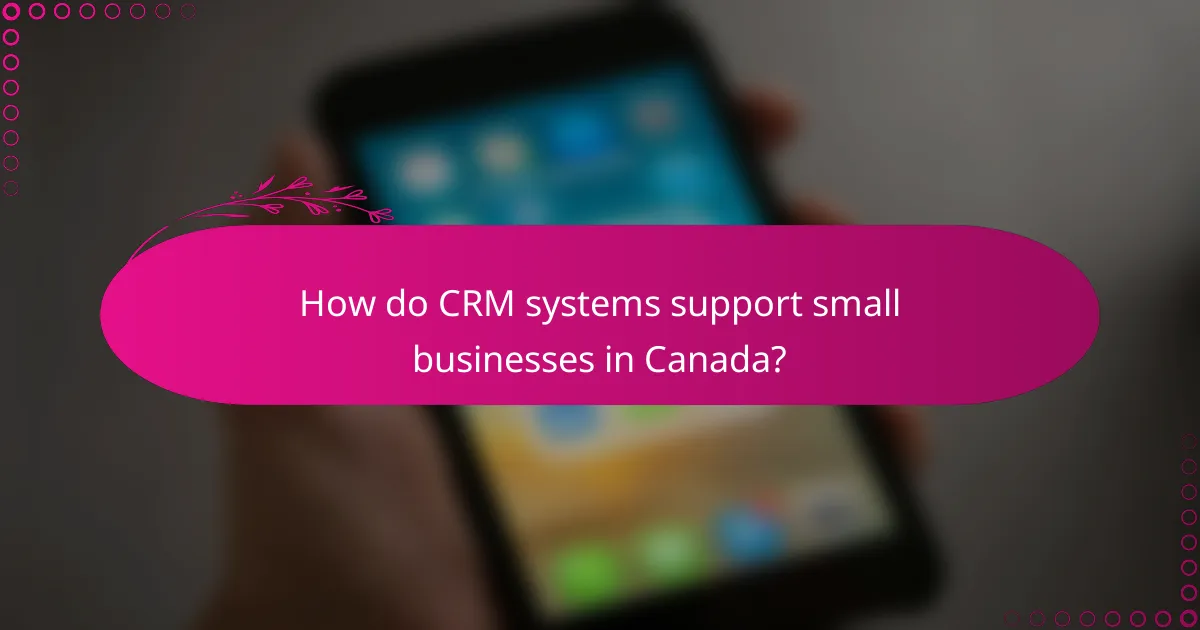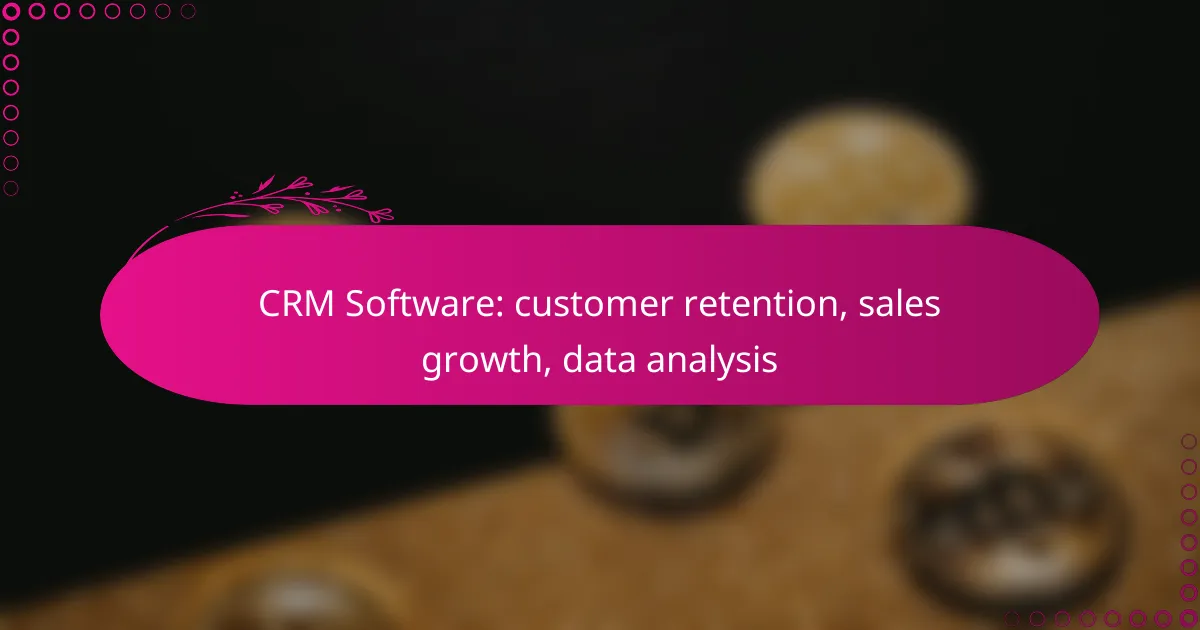CRM software plays a crucial role in enhancing customer retention and driving sales growth by enabling businesses to understand and respond to customer needs effectively. Through data analysis and personalized communication, companies can build stronger relationships with clients, fostering loyalty and repeat business. Additionally, key features like sales pipeline management and lead scoring streamline processes, ultimately boosting revenue and facilitating informed decision-making.

How can CRM software improve customer retention in Canada?
CRM software can significantly enhance customer retention in Canada by enabling businesses to understand and respond to customer needs more effectively. By leveraging data analytics and personalized communication, companies can foster stronger relationships with their clients, leading to increased loyalty and repeat business.
Personalized communication strategies
Personalized communication strategies involve tailoring messages and interactions based on individual customer preferences and behaviors. CRM systems can analyze customer data to segment audiences, allowing businesses to send targeted promotions or relevant information that resonates with specific groups. For example, a retail store might offer personalized discounts to frequent shoppers, enhancing their shopping experience and encouraging repeat visits.
To implement effective personalized communication, consider using customer names in emails and recommending products based on past purchases. This approach not only shows customers that you value them but also increases the likelihood of engagement and conversion.
Automated follow-up reminders
Automated follow-up reminders help ensure timely communication with customers, which is crucial for maintaining relationships. CRM software can schedule reminders for follow-ups after purchases or service interactions, prompting staff to reach out and check on customer satisfaction. This proactive approach can prevent issues from escalating and demonstrates a commitment to customer care.
For instance, a service-based business might set reminders to contact clients a week after a service is completed to gather feedback or offer additional services. This not only keeps the business top-of-mind but also opens the door for future sales opportunities.
Customer feedback integration
Integrating customer feedback into business processes is vital for improving retention. CRM software can collect and analyze feedback from various channels, such as surveys or social media, providing insights into customer satisfaction and areas for improvement. By actively listening to customers, businesses can make informed decisions that enhance their offerings.
For effective feedback integration, regularly review customer responses and implement changes based on their suggestions. This shows customers that their opinions matter and can lead to increased loyalty. Additionally, consider sharing how customer feedback has influenced changes, reinforcing the value of their input.

What features drive sales growth with CRM tools?
Key features that drive sales growth with CRM tools include effective sales pipeline management, lead scoring and prioritization, and seamless integration with marketing automation. These functionalities help businesses streamline their sales processes, enhance customer relationships, and ultimately boost revenue.
Sales pipeline management
Sales pipeline management allows businesses to visualize and track the stages of their sales process. By organizing leads and opportunities into distinct phases, teams can identify bottlenecks and optimize their approach to closing deals. Effective pipeline management can lead to improved forecasting and better resource allocation.
To maximize the benefits, regularly update the pipeline and ensure all team members have access to the latest information. Utilize CRM tools to set reminders for follow-ups and automate tasks to keep the pipeline moving efficiently.
Lead scoring and prioritization
Lead scoring and prioritization help sales teams focus their efforts on the most promising prospects. By assigning scores based on criteria such as engagement level, demographic information, and past interactions, businesses can identify which leads are more likely to convert. This targeted approach increases efficiency and improves conversion rates.
Establish clear criteria for scoring leads and regularly review these metrics to refine the process. Avoid overcomplicating the scoring system; a simple scale can often yield effective results. Consider integrating feedback from sales representatives to adjust scores based on real-world interactions.
Integration with marketing automation
Integrating CRM tools with marketing automation platforms enhances the flow of information between sales and marketing teams. This synergy allows for better alignment of strategies and more personalized customer interactions. Automated campaigns can nurture leads based on their position in the sales funnel, increasing the likelihood of conversion.
When implementing integration, ensure that data flows seamlessly between systems to avoid discrepancies. Regularly analyze the performance of automated campaigns and adjust them based on CRM insights. This continuous feedback loop can significantly enhance customer engagement and drive sales growth.

How does data analysis enhance CRM effectiveness?
Data analysis significantly enhances CRM effectiveness by providing actionable insights that drive customer retention and sales growth. By leveraging data, businesses can better understand customer behavior, predict sales trends, and track performance metrics, ultimately leading to more informed decision-making.
Customer behavior insights
Understanding customer behavior is crucial for tailoring marketing strategies and improving customer retention. Data analysis allows businesses to identify purchasing patterns, preferences, and engagement levels, which can inform personalized marketing efforts. For example, analyzing past purchase data can help businesses anticipate future needs and create targeted promotions that resonate with specific customer segments.
Utilizing tools like customer segmentation and predictive analytics can further enhance these insights. By grouping customers based on similar behaviors, companies can design more effective campaigns that cater to the unique characteristics of each segment, increasing the likelihood of repeat purchases.
Sales forecasting accuracy
Accurate sales forecasting is essential for effective inventory management and resource allocation. Data analysis improves forecasting by using historical sales data and market trends to predict future performance. This allows businesses to make proactive decisions, such as adjusting stock levels or planning marketing campaigns ahead of peak sales periods.
Employing statistical models and machine learning algorithms can enhance forecasting accuracy. Businesses should regularly review and adjust their forecasting models based on new data to ensure they remain relevant and effective in a changing market landscape.
Performance metrics tracking
Tracking performance metrics is vital for assessing the effectiveness of CRM strategies. Data analysis enables businesses to monitor key performance indicators (KPIs) such as customer acquisition cost, lifetime value, and churn rates. By regularly reviewing these metrics, companies can identify areas for improvement and adjust their strategies accordingly.
Implementing dashboards that visualize these metrics can facilitate quick decision-making. Businesses should focus on a few critical KPIs that align with their goals, ensuring they have a clear understanding of their CRM performance and can take timely action to enhance customer relationships and drive sales growth.

What are the key criteria for selecting CRM software?
When selecting CRM software, prioritize features that enhance customer retention, drive sales growth, and facilitate data analysis. Key criteria include scalability, integration capabilities, user-friendliness, and cost-effectiveness to ensure the software meets your business needs as it evolves.
Scalability for growing businesses
Scalability is essential for businesses anticipating growth. A CRM system should accommodate increasing data volumes and user numbers without compromising performance. Look for solutions that offer tiered pricing or modular features, allowing you to expand functionalities as your business evolves.
Consider cloud-based CRM options, which typically provide better scalability compared to on-premises solutions. This flexibility enables you to adjust resources based on current demands, ensuring your CRM can grow alongside your business.
Integration capabilities with existing tools
Effective CRM software must seamlessly integrate with your existing tools, such as email platforms, marketing automation, and accounting software. This integration streamlines workflows and enhances data consistency across systems, which is crucial for effective customer management.
Before choosing a CRM, assess its compatibility with your current technology stack. Look for APIs or built-in integrations that facilitate data transfer and communication between systems. A well-integrated CRM can save time and reduce errors, ultimately improving customer interactions.

How do CRM systems support small businesses in Canada?
CRM systems help small businesses in Canada by enhancing customer retention, driving sales growth, and facilitating data analysis. These tools streamline customer interactions, allowing businesses to better understand their clients and tailor their services accordingly.
Cost-effective solutions
Many CRM systems are designed to be affordable for small businesses, often offering tiered pricing models. This allows companies to choose a plan that fits their budget, typically ranging from low monthly fees to more comprehensive packages that include advanced features.
Additionally, cloud-based CRM solutions reduce the need for expensive hardware and maintenance costs. By leveraging subscription models, small businesses can access powerful tools without significant upfront investments.
User-friendly interfaces
User-friendly interfaces are crucial for small businesses that may not have dedicated IT staff. Most CRM systems prioritize simplicity, allowing users to navigate easily and perform tasks without extensive training.
Features such as drag-and-drop functionality and customizable dashboards enable quick access to essential data. This ease of use helps small businesses maximize their CRM’s potential, ensuring that team members can focus on customer engagement rather than technical issues.

What are the leading CRM software options in Canada?
The leading CRM software options in Canada include Salesforce, HubSpot CRM, and Zoho CRM. Each platform offers unique features tailored to enhance customer retention, boost sales growth, and facilitate data analysis.
Salesforce
Salesforce is a robust CRM platform widely recognized for its extensive customization capabilities and scalability. It is particularly suited for medium to large enterprises that require advanced data analysis and reporting tools.
Key features include automation of sales processes, customer service management, and integration with various third-party applications. Businesses can leverage Salesforce’s AI capabilities to gain insights into customer behavior and preferences, enhancing retention strategies.
HubSpot CRM
HubSpot CRM is known for its user-friendly interface and is ideal for small to medium-sized businesses looking to streamline their sales processes without extensive training. It offers a free tier with essential features, making it accessible for startups.
This platform provides tools for email tracking, lead management, and marketing automation. HubSpot’s integration with its marketing hub allows businesses to align sales and marketing efforts effectively, which can lead to improved customer engagement and retention.
Zoho CRM
Zoho CRM is a cost-effective solution that caters to businesses of all sizes, offering a wide range of features at competitive pricing. It includes modules for sales automation, marketing automation, and customer support, making it a comprehensive tool for managing customer relationships.
Zoho’s analytics capabilities allow users to track sales performance and customer interactions, helping businesses make data-driven decisions. Additionally, its mobile app ensures that sales teams can access critical information on the go, enhancing productivity and responsiveness.

How can CRM software facilitate data compliance in Canada?
CRM software can help businesses in Canada comply with data protection regulations by providing tools for managing customer data securely and transparently. These systems often include features that align with Canadian privacy laws, ensuring that organizations can handle personal information responsibly.
GDPR and PIPEDA compliance features
CRM systems designed for compliance with GDPR (General Data Protection Regulation) and PIPEDA (Personal Information Protection and Electronic Documents Act) offer essential features such as data encryption, access controls, and audit trails. These functionalities help businesses protect personal data and manage consent effectively.
For example, a CRM can automate the process of obtaining and recording customer consent for data usage, ensuring that organizations can demonstrate compliance during audits. Additionally, features like data anonymization can help mitigate risks associated with data breaches.
When selecting a CRM, look for those that provide clear documentation on their compliance capabilities and regularly update their systems to reflect changes in regulations. This proactive approach minimizes the risk of non-compliance and enhances customer trust.
